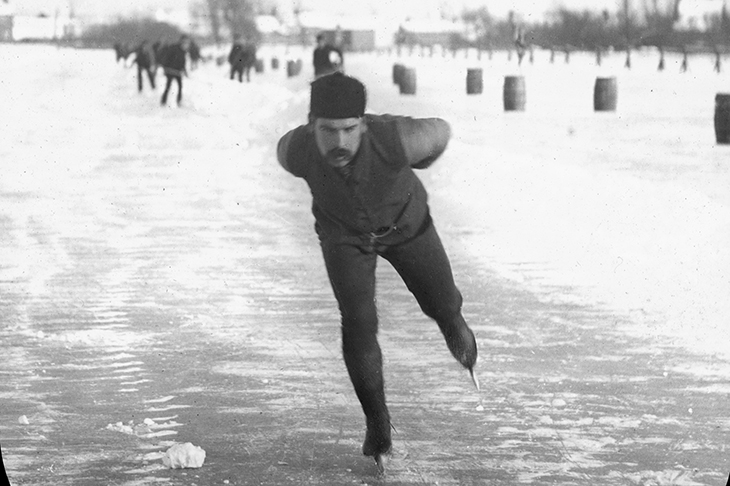In landscape terms, the Fens don’t have much going for them. What you can say for them, though, is that they’re flat — a selling point for lovers of flat racing.
This aspect was not lost on James I when, while out hunting in 1605, he came across the village of Newmarket, and 60 years later his grandson Charles II, who inherited the Stuart love of the sport of kings, would build a palace and stables in the Suffolk village. Today the remains of Palace House and the King’s Yard are home to the National Heritage Centre for Horseracing & Sporting Art, which houses a world-class collection of sporting art by Stubbs, Landseer, Munnings and Skeaping. But its latest exhibition focuses on a sport with a more surprising Stuart connection — skating. While in exile in the Netherlands in 1648, the teenage James II acquired a taste for scooting over the ice with blades strapped to his boots, and he introduced the sport to the English court on his return.
In Holland skating hardly ranked as a sport. When frozen waterways became impassable to boats, skates were an alternative mode of transport. In Cornelis Beelt’s ‘Skaters on a Frozen River’ (c.1660), a peasant loads hay on to a horse-drawn sled; in Anthonie Verstraelen’s ‘Ice Scene’ (c.1640), an urban couple teeters across a river in fashionable bustles and pantaloons. By the following century, skating had become a spectator sport: in Cornelis Troost’s ‘Winter Fun’ (1740), a drinker at a pop-up bar trains his eye glass on an avalanche of petticoats as a passing lady slips and performs a horizontal cancan.
In France, where Louis XVI had introduced skating to Paris, displays of petticoats were confined to dance halls. On the flooded fields of La Glacière, gentlemen pulled ladies across the ice in carriages shaped like swans or gondolas. The rink was an arena for male display; an excuse for Parisian dandies to don tights. The balletic moves outlined in Jean Garcin’s ‘Le Vrai Patineur’ (1813) were explicitly designed to ‘seduce weak mortals’ of unspecified sex. They included ‘L’Adonis’ — right arm raised — ‘L’Apollon’ — left arm raised — and ‘Le Beau Narcisse’ — both arms raised and bent above the head in a half-Mobot. Only French skaters, sniffed Garcin, had any style; with the Germans, English and Danes either ‘the body is bent, the arms swinging… or straight as a picket, all stiff, inflexible, without grace, without attitude’.
True of the English, perhaps, though not the Scots, as demonstrated by the effortless ease with which the Reverend Robert Walker glides across Duddingston Loch in Henry Raeburn’s famous painting of the 1790s. The National Galleries of Scotland wouldn’t lend this iconic image, but in its place there are two paintings by Raeburn’s pupil Charles Lees: ‘Skaters on Duddingston Loch by Moonlight’ (1857) (see p69) shows an Edinburgh swell in top hat and frock coat swooping swallow-like over the ice as lesser mortals totter and topple around him, and ‘Skating on Linlithgow Loch’ (1858) features a major pile-up.
If figure skating was for dandies, speed skating was for oiks, with the Fens — drained with Dutch help in the 1650s — providing the perfect surface. By the 1890s fixtures at Littleport and Lingay were attracting international competitors, with punters packing on to trains from Liverpool Street. Victorian lantern slides document the speed skating heroes of the day, from hunky New Yorker Joseph F. Donoghue in natty racing sweater and matching headband to veteran local talent William ‘Turkey’ Smart, who acquired his nickname from his bent posture and flapping arms — a style confirming Garcin’s worst prejudices about the English, while keeping this agricultural labourer from Welney at the top of his game for 40 years. But the show’s star turn, captured going like the clappers in a 1920s Pathé film, is Wisbech-born blacksmith Cyril W. Horn, his clinging jersey revealing good honest pecs earned in the forge rather than the gym. A girl can tell.
So far, girls are noticeably absent from an arena they would come to dominate. One who broke through the ice ceiling early was Mrs Winters, also of Welney, pictured in 1892 in the fur-trimmed ankle-length coat in which she rather unsportingly beat a 13-year-old competitor to the women’s title at Littleport. The invention of the ice rink would tip the balance in favour of women, although an 1844 report on the Grafton Street Glaciarium still describes skating as a ‘manly pastime’. It was not until male skaters lost their monopoly on tights that women grabbed the spotlight.
The show closes with a series of Bassano Studio photographs of teenage skating stars of the 1930s posed like Hollywood starlets, but it’s Bern Schwartz’s 1977 portrait of John Curry hugging his skates that sticks in the mind: Apollo, Adonis and Narcissus rolled into one.






Comments